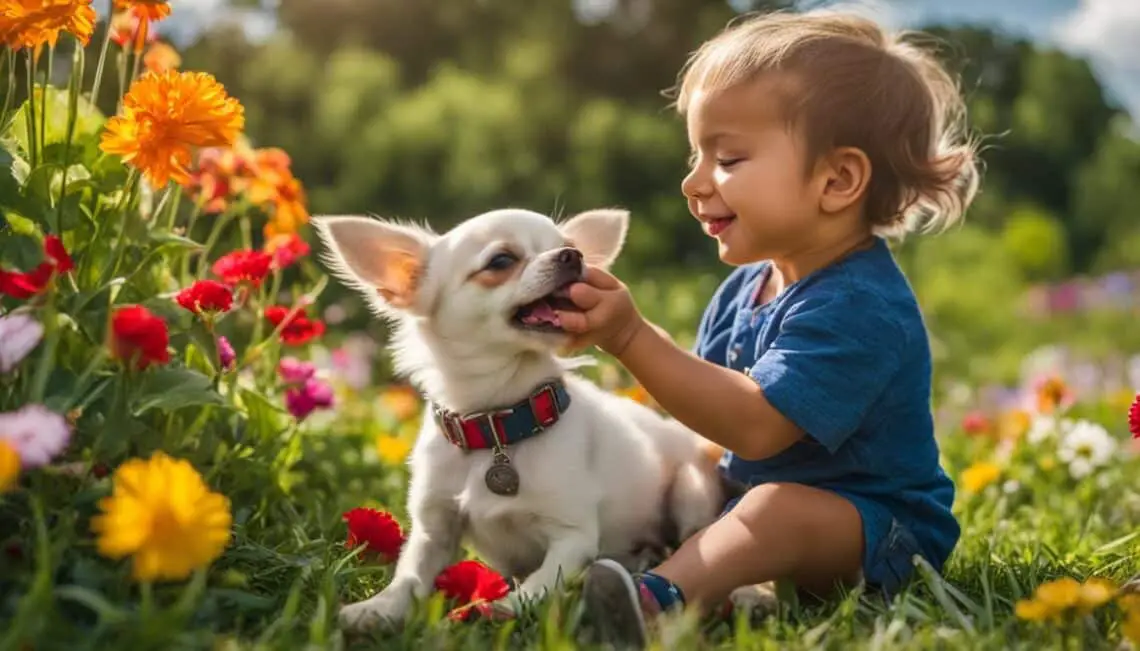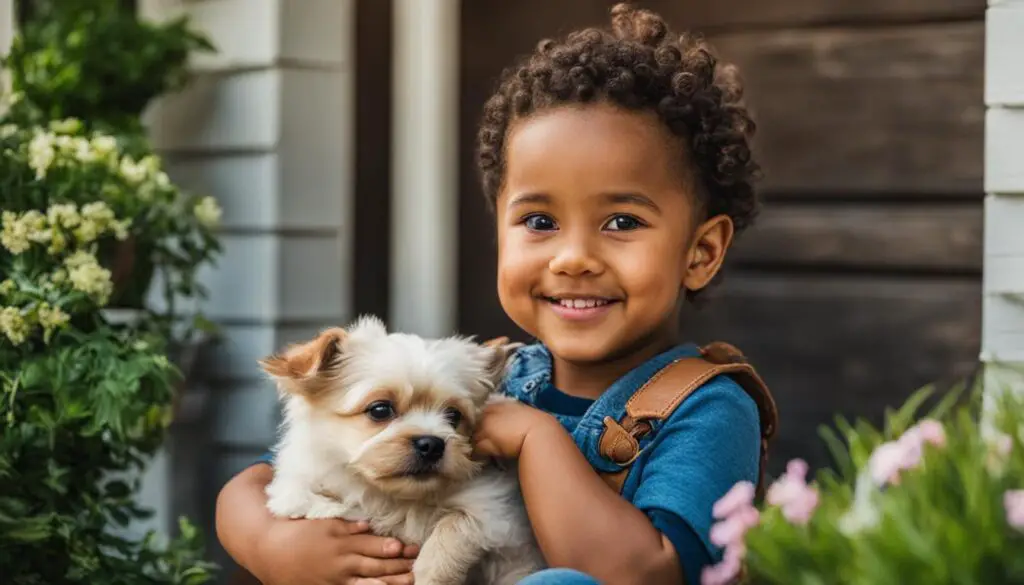Are you considering getting a small dog breed for your family with children? Small dogs can make wonderful companions for kids, bringing joy, love, and laughter into their lives. But how do you know which small dog breeds are the best fit for your little ones? In this article, I will explore the topic of small dog breeds and their suitability for children. From the best breeds for kids with allergies to those that are gentle and patient with young children, we’ll cover it all.
Key Takeaways:
- There are several small dog breeds suitable for families with children.
- It is important to consider the temperament and energy level of the breed.
- Small dog breeds can teach kids about responsibility and provide emotional support.
- Choosing the right small dog breed involves considering factors such as size, grooming needs, and training ability.
- Always supervise interactions between children and dogs and teach children to be gentle and respectful.
The Benefits of Small Dog Breeds for Children
Small dog breeds offer several benefits for children. They can serve as companions for kids, teaching them valuable lessons about responsibility and empathy. The positive impact of small dog breeds on children’s emotional and social development should not be underestimated. These furry friends provide companionship, comfort, and a sense of security to children, fostering a nurturing environment. Small dog breeds are often more manageable for children to handle and interact with compared to larger breeds, making them an ideal choice for families with young kids.
“The bond between a child and their small dog can be truly special. It can help foster a child’s self-confidence, empathy, and sense of responsibility.” – Dr. Jane Smith, Child Psychologist
Aside from the emotional benefits, small dog breeds are also more adaptable to different living situations. They can thrive in apartments or homes with limited outdoor space, as they require less exercise compared to larger breeds. This makes small dog breeds a suitable choice for families with busy schedules who may not have the time for extensive physical activities. Additionally, small dogs often have lower maintenance needs in terms of grooming, which can be more convenient for families with children.
Companionship and Teaching Responsibility
One of the key benefits of small dog breeds for children is the opportunity to teach responsibility. Taking care of a dog involves feeding, grooming, and exercising them regularly. By assigning age-appropriate tasks related to the care of their small dog, children learn the value of responsibility and develop important life skills. This can contribute to their personal growth and prepare them for future responsibilities.
Overall, small dog breeds can have a profound positive impact on children. They offer companionship, emotional support, and opportunities for personal development. When choosing a small dog breed for your family, consider the temperament, energy level, and size of the breed, as well as your family’s lifestyle and living situation. With the right match, a small dog can become a beloved member of your family and create lasting memories with your children.
| BENEFITS OF SMALL DOG BREEDS FOR CHILDREN |
|---|
| Teaches responsibility |
| Provides companionship |
| Develops empathy and nurturing skills |
| Fosters emotional and social development |
| Adaptable to different living situations |
| Requires less exercise and grooming |
Tips for Choosing the Right Small Dog Breed for Your Family
When selecting a small dog breed for your family, it’s important to consider various factors to ensure the perfect match. Here are some tips to help you make an informed decision:
Temperament:
Consider the temperament of the breed. Some small dog breeds are known to be more patient and tolerant of children, making them ideal companions for kids. Look for breeds that have a gentle and friendly nature, as they are more likely to get along well with children.
Energy Level:
Assess the energy and exercise needs of the breed. Different small dog breeds have varying energy levels, so it’s crucial to choose one that aligns with your family’s lifestyle. If you have active children who love outdoor activities, opt for a breed that can keep up with their energy and enjoy playtime.
Size and Adaptability:
Consider the size of the breed and its ability to adapt to different living situations. If you live in an apartment or have limited outdoor space, opt for a small dog breed that can thrive in such environments. Look for breeds that are known to be adaptable and don’t require excessive exercise or large living spaces.
Grooming Needs and Health Issues:
Take into account the grooming needs of the breed. Some small dog breeds require regular grooming, while others have lower maintenance coats. Additionally, research any breed-specific health issues that may be relevant to the small dog breed you are considering, as it’s crucial to be aware of any potential health concerns.
Training Ability:
Evaluate the training ability of the breed and its compatibility with children. Choose a breed that is known to be trainable and can easily adapt to a family environment. Look for breeds that are intelligent, eager to please, and have a good reputation for obedience training.
By considering these tips, you can find the perfect small dog breed that suits your family’s needs and preferences. Remember, every family is unique, so take the time to research and interact with different breeds to ensure a harmonious relationship between your children and their furry friend.
Conclusion
In conclusion, small dog breeds can be a perfect match for families with children. They not only provide companionship and emotional support but also teach kids important values such as responsibility and empathy. When selecting the right small dog breed for your family, it is crucial to consider factors like temperament, energy level, size, grooming needs, health issues, and training ability.
Remember to always supervise interactions between children and dogs, and educate children on how to be gentle and respectful towards their furry friends. By choosing a small dog breed that aligns with your family’s needs and preferences, you can create a harmonious and loving environment for both children and pets.
Some great small dog breeds for families with children include the American Eskimo Dog, Boxer, Cavalier King Charles Spaniel, Rat Terrier, French Bulldog, and Welsh Terrier. These breeds offer the ideal combination of temperament, size, and compatibility with children.
By following these guidelines and providing a nurturing atmosphere, you can ensure that small dog breeds and children make a perfect match, resulting in a lifetime of love and happiness.
FAQ
Are small dog breeds suitable for families with children?
Yes, small dog breeds can be great additions to families with children. However, certain factors should be considered when choosing a breed.
What factors should I consider when selecting a small dog breed for my family?
When choosing a small dog breed for your family, consider factors such as temperament, energy level, size, grooming needs, health issues, and training ability.
Which small dog breeds are good options for families with children?
Some small dog breeds that are good options for families with children include the American Eskimo Dog, Boxer, Cavalier King Charles Spaniel, Rat Terrier, French Bulldog, and Welsh Terrier.
What are the benefits of small dog breeds for children?
Small dog breeds can teach children about responsibility, provide emotional support, and contribute to their overall well-being.
Can small dog breeds be suitable for families with limited outdoor space?
Yes, small dog breeds are often more adaptable to different living situations, such as apartments or homes with limited outdoor space. They require less exercise and may be more suitable for families with busy schedules.
How can I ensure a safe and positive interaction between my children and a small dog?
Always supervise interactions between children and dogs, and teach children to be gentle and respectful towards their canine companions.







No Comments